Two women disappointed in Hauraki District Council’s new rating scheme are “sticking their necks out” and refusing to pay the increase.
They say the new rates – which have almost tripled compared to last financial year – have “gone beyond” their pension.
But council have said the risk of not paying rates could result in penalties and debt collection, although that was a “last resort”.
Vivienne Harper and Dawn Sinclair own a cottage each at Waihī Lifecare.
Earlier, Vivienne told The Profile her rates in the 2021-22 financial year were $822.64. Her new rates bill for 2022-23 had increased to $2379.21.
And even though residents at the Toomey St village could apply for a $700 rebate, the rates were still $1000 more than the previous year and were “unfair”, she said.
“Why do you think people come into villages? They’ve gone past being able to pay these rates outside,” Vivienne said. “I never thought for a moment that this would be a big hit on the oldies. It’s just gone beyond our ability to live here as a single pensioner.”
In this year’s annual plan, Hauraki District Council voted to introduce set charges for each inhabited part of a property – the technical term being: Separately Used and Inhabited Parts, or, SUIPs.
Retirement villages, farms, and lifestyle properties were likely going to be impacted.
It was all to make sure everyone was paying their “fair share”, because according to council, 94 per cent of properties in the Hauraki only had one dwelling on them.
SUIPs now meant these property owners paid around $90 less than they did in 2021/22. The remaining six per cent of properties with multiple SUIP’s now paid more – around $930 per SUIP.
“We’re quite happy to pay something, but we never expected to get clobbered like this,” Vivienne said. “I for one, just can’t pay it on my pension.”
Last financial year, Dawn’s quarterly instalment was $205.66. This year, her first instalment will be $586.63.
She said council needs to encourage good, affordable housing that offered “peace of mind” to its residents.
“A lot of the reason people are here is for peace of mind, so this setup has been great as an example of an affordable village… we need more of these types of places,” she said.
Council’s group manager business support Duncan Peddie said it was important that all residents in the district were treated the same and contributed toward all services and activities they benefited from.
“We try all avenues to come to an arrangement for payment of rates – debt collection is only used as a last resort,” he said.
“With every instalment sent out, we encourage people to contact us if they are having trouble paying or aren’t able to pay. When they contact us, we work with them to try to organise a payment plan that suits their needs and their budgets.”
If council isn’t contacted, and payment isn’t made, a penalty is added to the outstanding balance after the due date.
Non-payment of rates in relation to a dispute over whether the rates are fair or affordable would not stop a debt collection process, he said.

Waihī Lifecare residents and pensioners Vivienne Harper and Dawn Sinclair are ‘sticking their necks out’ and refusing to pay a district council rate increase. Photo: KELLEY TANTAU
Pensioners stand up against rate increase




